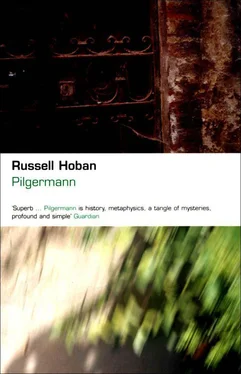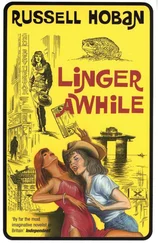Russell Hoban - Pilgermann
Здесь есть возможность читать онлайн «Russell Hoban - Pilgermann» весь текст электронной книги совершенно бесплатно (целиком полную версию без сокращений). В некоторых случаях можно слушать аудио, скачать через торрент в формате fb2 и присутствует краткое содержание. Год выпуска: 2002, Издательство: Bloomsbury Publishing PLC, Жанр: Современная проза, на английском языке. Описание произведения, (предисловие) а так же отзывы посетителей доступны на портале библиотеки ЛибКат.
- Название:Pilgermann
- Автор:
- Издательство:Bloomsbury Publishing PLC
- Жанр:
- Год:2002
- ISBN:нет данных
- Рейтинг книги:5 / 5. Голосов: 1
-
Избранное:Добавить в избранное
- Отзывы:
-
Ваша оценка:
- 100
- 1
- 2
- 3
- 4
- 5
Pilgermann: краткое содержание, описание и аннотация
Предлагаем к чтению аннотацию, описание, краткое содержание или предисловие (зависит от того, что написал сам автор книги «Pilgermann»). Если вы не нашли необходимую информацию о книге — напишите в комментариях, мы постараемся отыскать её.
Pilgermann — читать онлайн бесплатно полную книгу (весь текст) целиком
Ниже представлен текст книги, разбитый по страницам. Система сохранения места последней прочитанной страницы, позволяет с удобством читать онлайн бесплатно книгу «Pilgermann», без необходимости каждый раз заново искать на чём Вы остановились. Поставьте закладку, и сможете в любой момент перейти на страницу, на которой закончили чтение.
Интервал:
Закладка:
‘Are they in your eyes also, Sophia and my son?’ I said.
‘Yes,’ he said. ‘I’m sorry, I don’t mean to intrude, I can’t help it.’
‘We’ll try together then to leave Antioch?’ I said.
‘Yes,’ he said, ‘we must at least try.’
‘Ought we to warn anyone before we go?’ I said.
He shook his head. ‘Those who had in mind to leave have already gone and I don’t think that the others will be moved to act on what we have seen in our night journey. What is more likely is that we shall be taken for spies.’
We went back to the house and armed and provisioned ourselves. We were going to make the attempt on foot — in the present circumstances it was our best chance of going unseen and unheard and acting as the moment required. With a bag and a bow slung on my shoulder, with a quiver of arrows on one side and Firouz’s sword on the other I paused to look at the fountain in the courtyard and to listen to the plashing of the silvery water, thirsting for it with my eyes.
When we came out into the street the very air seemed strange, apocalyptic. I doubted my own reality, I was surprised to hear footfalls and voices around me, surprised to smell the hot and pungent smells of every day. I waited for the earth to shake but it did not, I expected everyone to stare open-mouthed at us but they did not, then I thought that perhaps we might be invisible to them and I wanted to shout but I did not.
The walls were manned as fully as possible now night and day and there were always sentries at all of the gates. We dared not wait for the darkness and the chance of going over the wall with a rope — not only were there our own sentries to avoid but we both had no doubt whatever that the Franks would also be waiting for the darkness of this night to come over those same walls into Antioch. We had no plan beyond getting out of Antioch; if we were able to do that we should consider what to do next.
We headed for the Iron Gate east of the Citadel where in the winter Onopniktes entered its channel. It was by way of that cleft in the mountain that many people now went to forage and we hoped not to be noticed there. This day, however, was not like other days: on this day Firouz was at the Iron Gate with the soldiers of the guard.
Only a few moments ago I had felt as if we might be invisible but now suddenly it was as if all the crowded space around us became blank and empty and in the whole world only we were to be seen. Firouz was pacing back and forth with his turning walk. The sky had gone grey and the shadow that turned and twisted with him was dull and blurred. He had seen us approaching, and for us to turn away now would invite more trouble than to continue towards the gate.
There swept over me a wave of irritation: I was annoyed with everything and everybody, even with Sophia and my little son that they had come thus at the eleventh hour to interfere with the smooth and orderly winding-up of my affairs. My being was grating on this day as the teeth grate on a stone in the bread. In my heart and soul I knew it to be my last day; I knew that the stones of my little history and the world’s great one were fitted together so precisely by cause and held in place so firmly by effect that the feeble knifeblade of my too-late good intention could not even find a crack between them let alone pry them apart. And it was in this state of mind that I stood before Firouz on the morning of the first of Tammuz in the Christian year of 1098.
Firouz looked at us with satisfaction. ‘Where are you going?’ he said.
I wanted to say, ‘To find Sophia and my son.’ I didn’t want to have to take Firouz into account sufficiently to have to lie to him.
‘We’re going to have a look around Suwaydiyya,’ said Bembel Rudzuk. ‘I think some of the merchants there may have provisions they’ve hidden away from the Franks.’
‘Very daring,’ said Firouz, ‘with so many Franks between here and Suwaydiyya. Very daring indeed.’ He was looking at the sword I was wearing that used to be his.
‘I know the back ways,’ said Bembel Rudzuk.
‘I don’t doubt it,’ said Firouz. He took the bag that was slung from my shoulder and looked into it. ‘You won’t starve while you’re out looking for provisions, will you,’ he said. ‘You’re got enough food here for a week. Will you be back in time to stand guard on the wall tonight?’
‘Yes,’ I said. ‘We don’t go on until midnight.’
‘Good,’ said Firouz. ‘I think it’s probably best if I lock you up until then; that way you won’t wear yourselves out walking all those weary miles and you’ll be alert and well-rested for tonight.’
‘We haven’t done anything to be locked up for,’ said Bembel Rudzuk.
‘Not yet,’ said Firouz. ‘But you inspire doubt and mistrust in me, and as I’m in command of this part of the wall I’m taking it on myself to keep out of trouble.’
‘No!’ I cried out. ‘You mustn’t do that!’
‘Why not?’ said Firouz.
‘Because tonight may be the night the Franks take Antioch!’ I blurted out.
Firouz jumped back as if I had thrust a viper into his face. ‘Who told you that?’ he said.
‘It came to me in a dream, a vision, a night journey,’ I said.
‘Have you told this to anyone else?’ said Firouz.
‘No,’ I said.
Firouz motioned to two of the guards. ‘Lock these two up in the tower,’ he said.
I began to laugh, I couldn’t help it.
‘What are you laughing at?’ said Firouz.
‘Life and death,’ I said. ‘It’s so hard to make a good job of either.’
Firouz began to laugh too. ‘You’re right,’ he said. ‘Truly it doesn’t give me pleasure to lock you up, it’s just that all of us have different things to do and this is what I have to do.’
‘It doesn’t really matter,’ I said. ‘It’s only life and death.’
‘It’s strange,’ said Firouz: ‘people buy and sell, they go here and there, they make plans for this year and the next year as if there will be no end to life, as if there will always be a next day and a next year; but sometime there must come an end to the days and the years; it must be like walking into a wall where one has always found a door.’ While he said this reflectively and in a companionable manner as if we were sitting in a coffee house Bembel Rudzuk and I stood before him with a guard on either side of us. When he had completed this observation the guards took away our bows and arrows, our swords and daggers and our bags. ‘Your weapons and your other possessions will be given back to you later,’ said Firouz as the guards took us away to the tower.
Later than what? I thought. With the two guards behind us we climbed the stone stairs to that part of Firouz’s tower that rose above the wall. There we were taken up more stairs to the top of the tower and put into a little room in which there was nothing but an overwhelming stench of urine and excrement and a bucket that had not been emptied for a very long time. A little dimness was provided by a high-up window that was too small to squeeze through.
I beat on the door to ask for the bucket to be emptied. There was no response of any kind. ‘This is to be our end then,’ I said, ‘in a little dim room with a bucket of old shit.’
‘Be glad we’re in the room and not in the bucket,’ said Bembel Rudzuk.
We sat on the floor and looked up and down and all around the little room. It was so dreadfully finite. There was no possibility whatever of there being any more to it than we could see.
‘What Firouz said about buying and selling, do you think he meant anything by it, do you think he wanted to be bribed?’ I said.
‘I think he’s already been bought by the Franks,’ said Bembel Rudzuk.
Читать дальшеИнтервал:
Закладка:
Похожие книги на «Pilgermann»
Представляем Вашему вниманию похожие книги на «Pilgermann» списком для выбора. Мы отобрали схожую по названию и смыслу литературу в надежде предоставить читателям больше вариантов отыскать новые, интересные, ещё непрочитанные произведения.
Обсуждение, отзывы о книге «Pilgermann» и просто собственные мнения читателей. Оставьте ваши комментарии, напишите, что Вы думаете о произведении, его смысле или главных героях. Укажите что конкретно понравилось, а что нет, и почему Вы так считаете.












